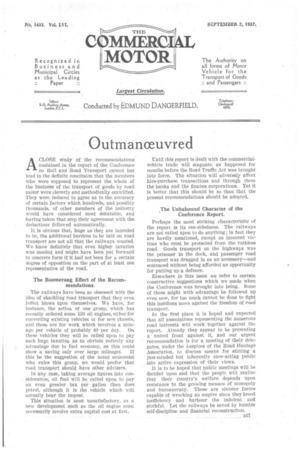Outmanoeuvred
Page 35

If you've noticed an error in this article please click here to report it so we can fix it.
ACLOSE study of the recommendations contained in the report of the Conference on Rail and Road Transport . cannot but lead to the definite conclusion that the members who were supposed to represent the whole of the business of the transport of goods by road motor were cleverly and methodically outwitted. They were induced to agree as to the accuracy of certain factors which hundreds, and possibly thousands, of other members of the industry would have considered most debatable, and having taken that step their agreement with the deductions followed automatically.
It is obvious that, huge as they are intended to be, the additional burdens to be laid on road transport are not all that the railways wanted. We know definitely that even higher taxation was mooted and might have been put forward in concrete form if it had not been for a certain degree of opposition on the part of at least one representative of the road.
The Boomerang Effect of the Recommendations.
The railways have been so obsessed with the idea of shackling road transport that they even inflict blows upon themselves. We have, for instance, the action of one group, which has recently ordered some 150 oil engines, either for converting existing vehicles or for new chassis, and these are for work which involves a mileage per vehicle of probably 40 per day. On these Vehicles they will be called upon to pay such huge taxation as to obviate entirely any advantage due to fuel economy, as this could show a saving only over. large mileages. If this be the suggestion of the noted economist who rules this group, we would prefer that road transport should have other advisers. In any case, taking average figures into consideration, oil fuel will be called upon to pay an even greater tax per gallon than does petrol, although it is the vehicle which will actually bear the impost.
This situation is most unsatisfactory, as a new development such as the oil engine must necessarily involve extra capital cost at first. Until this report is dealt witb the commercialvehicle trade will stagnate, as happened for mouths before the Road Traffic Act was brought into force. The situation will adversely affect hire-purchase transactions and through them the banks and the finance corporations. Yet it is better, that this should be so than that the present recommendations should be adopted.
The Unbalanced Character of the Conference Report.
Perhaps the most striking characteristic of the report is its one-sidedness. The railways are not called upon to do anything ; in fact they are hardly mentioned, except as innocent victims who must be protected from the ruthless road. Goods transport on the highways was the prisoner in the dock, and passenger road transport was dragged in as an accessory—and sentenced without being afforded an opportunity for putting up a defence.
Elsewhere in this issue we refer to certain constructive suggestions which we made when the Conference was brought into being. Some of these might with advantage be followed up even now, for too much cannot be done to fight this insidious move against the freedom of road transport.
In the first place it is hoped and expected that all associations representing the numerous road interests will work together against the report. Already they appear to be presenting a united front against it, and our urgent recommendation is for a meeting of their delegates, under the auspices of the Road Haulage Association, to discuss means for stirring a just-minded but inherently slow-acting public into active expression of their views.
It is to be hoped that public meetings will be decided upon and that the people will realize that their country's welfare depends upon resistance to the growing menace of monopoly and bureaucracy. These are sinister forces capable of wrecking an empire since they breed inefficiency and harbour the indolent and slothful. Let the railways be saved by humble self-discipline and financial reconstruction.




































































































